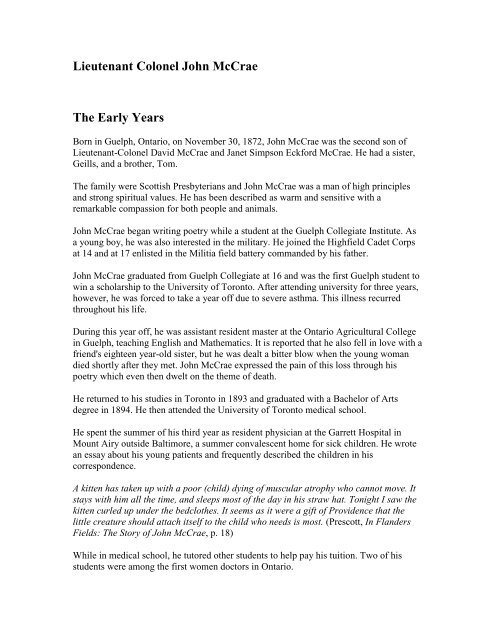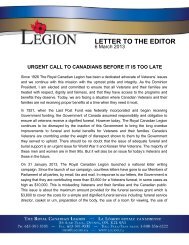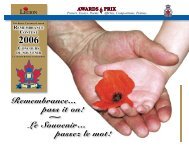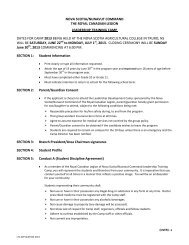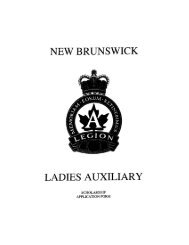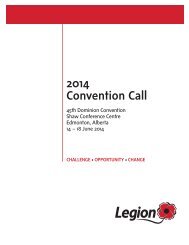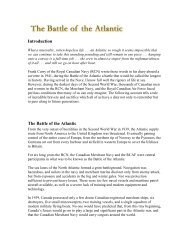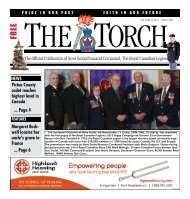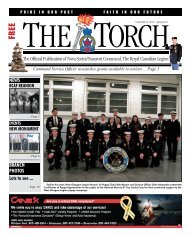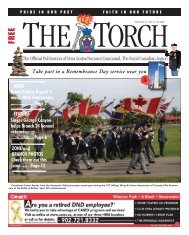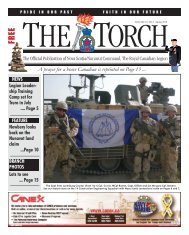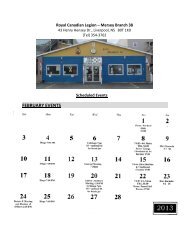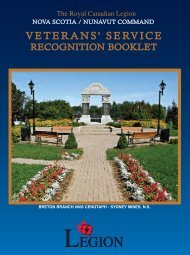Lieutenant Colonel John McCrae - Royal Canadian Legion
Lieutenant Colonel John McCrae - Royal Canadian Legion
Lieutenant Colonel John McCrae - Royal Canadian Legion
- No tags were found...
You also want an ePaper? Increase the reach of your titles
YUMPU automatically turns print PDFs into web optimized ePapers that Google loves.
<strong>Lieutenant</strong> <strong>Colonel</strong> <strong>John</strong> <strong>McCrae</strong>The Early YearsBorn in Guelph, Ontario, on November 30, 1872, <strong>John</strong> <strong>McCrae</strong> was the second son of<strong>Lieutenant</strong>-<strong>Colonel</strong> David <strong>McCrae</strong> and Janet Simpson Eckford <strong>McCrae</strong>. He had a sister,Geills, and a brother, Tom.The family were Scottish Presbyterians and <strong>John</strong> <strong>McCrae</strong> was a man of high principlesand strong spiritual values. He has been described as warm and sensitive with aremarkable compassion for both people and animals.<strong>John</strong> <strong>McCrae</strong> began writing poetry while a student at the Guelph Collegiate Institute. Asa young boy, he was also interested in the military. He joined the Highfield Cadet Corpsat 14 and at 17 enlisted in the Militia field battery commanded by his father.<strong>John</strong> <strong>McCrae</strong> graduated from Guelph Collegiate at 16 and was the first Guelph student towin a scholarship to the University of Toronto. After attending university for three years,however, he was forced to take a year off due to severe asthma. This illness recurredthroughout his life.During this year off, he was assistant resident master at the Ontario Agricultural Collegein Guelph, teaching English and Mathematics. It is reported that he also fell in love with afriend's eighteen year-old sister, but he was dealt a bitter blow when the young womandied shortly after they met. <strong>John</strong> <strong>McCrae</strong> expressed the pain of this loss through hispoetry which even then dwelt on the theme of death.He returned to his studies in Toronto in 1893 and graduated with a Bachelor of Artsdegree in 1894. He then attended the University of Toronto medical school.He spent the summer of his third year as resident physician at the Garrett Hospital inMount Airy outside Baltimore, a summer convalescent home for sick children. He wrotean essay about his young patients and frequently described the children in hiscorrespondence.A kitten has taken up with a poor (child) dying of muscular atrophy who cannot move. Itstays with him all the time, and sleeps most of the day in his straw hat. Tonight I saw thekitten curled up under the bedclothes. It seems as it were a gift of Providence that thelittle creature should attach itself to the child who needs is most. (Prescott, In FlandersFields: The Story of <strong>John</strong> <strong>McCrae</strong>, p. 18)While in medical school, he tutored other students to help pay his tuition. Two of hisstudents were among the first women doctors in Ontario.
While training as a doctor, he was also perfecting his skills as a poet. At university, hehad 16 poems and several short stories published in a variety of magazines, includingSaturday Night.He also continued his connection with the military, becoming a gunner with the Number2 Battery in Guelph in 1890, Quarter-Master Sergeant in 1891, Second <strong>Lieutenant</strong> in1893 and <strong>Lieutenant</strong> in 1896. At university, he was a member of the Queen's Own Riflesof Canada of which he became company captain.In 1898, <strong>John</strong> <strong>McCrae</strong> received a Bachelor of Medicine degree and the gold medal fromthe University of Toronto medical school. He worked as resident house officer at TorontoGeneral Hospital from 1898 to 1899.In 1899, he went to Baltimore and interned at the <strong>John</strong>s Hopkins Hospital where hisbrother Thomas had worked as assistant resident since 1895. There, both <strong>John</strong> andThomas <strong>McCrae</strong> became close associates of Dr. William Osler, the pre-eminent medicaleducator of his time.The South African WarWhen the South African War started in October 1899, <strong>John</strong> <strong>McCrae</strong> felt it was his duty tofight. In order to serve in South Africa, he requested postponement of a fellowship inpathology that he had been awarded at McGill University in Montréal. He wassubsequently commissioned to lead an artillery battery from his home town. This Guelphcontingent became part of D Battery, <strong>Canadian</strong> Field Artillery.<strong>John</strong> <strong>McCrae</strong> sailed to Africa in December and spent a year there with his unit. When heleft South Africa, it was with mixed feelings about war. He was still convinced of theneed to fight for one's country but shocked by the poor treatment of the sick and injuredsoldiers.<strong>John</strong> <strong>McCrae</strong> resigned from the 1st Brigade of Artillery in 1904 after being promoted toCaptain and then Major. He was not involved with the military again until 1914.The Young DoctorBack in Montréal in 1901, <strong>John</strong> <strong>McCrae</strong> picked up the thread of his life, resuming hisstudies in pathology. The years after the war were busy ones for the young doctor. AsGovernor's Fellow in pathology and resident assistant pathologist, he had the dual
function of research work in the Medical Faculty laboratories at McGill and autopsyduties at Montréal General Hospital.In 1902, he was appointed resident pathologist at Montréal General Hospital and lateralso became assistant pathologist to the <strong>Royal</strong> Victoria Hospital. In 1904, he wasappointed an associate in medicine at the <strong>Royal</strong> Victoria Hospital. Later that year, hewent to England where he studied for several months and became a member of the <strong>Royal</strong>College of Physicians.In 1905, he set up his own practice although he continued to work and lecture at severalhospitals. He was appointed pathologist to the Montréal Foundling and Baby Hospital in1905. In 1908, he was appointed physician to the <strong>Royal</strong> Alexandra Hospital for InfectiousDiseases.During these busy years, he also lectured in pathology at the University of VermontMedical College in Burlington and in clinical medicine and pathology at McGill. Heattended medical conferences in Europe and wrote extensively on medical subjects,including articles for the Montreal Medical Journal and American Journal of MedicalScience.Both <strong>John</strong> and Thomas <strong>McCrae</strong> were major contributor's to Osler's Modern Medicine, a10-volume textbook published in 1909. In addition, <strong>John</strong> <strong>McCrae</strong> co-authored a textbookon pathology which was published in 1912.He was a respected teacher and doctor, much in demand due to his enthusiasm and senseof responsibility to his patients, students and colleagues. He was a gregarious man withmany friends. His busy schedule included time for socializing and holidays.Although <strong>McCrae</strong> worked hard at his university teaching and at his increasingly busypractice, the advantage of working in a university was that he could take time off. Heholidayed at various times in England, France and Europe . . . At times he worked hispassage to Europe as ship's surgeon; he enjoyed ships and the sea. These were thecompensations of a bachelor's life. (Prescott, In Flanders Fields: the Story of <strong>John</strong><strong>McCrae</strong>, p. 70)An avid outdoorsman, <strong>John</strong> <strong>McCrae</strong> was invited in 1910 to serve as expedition physicianwhen the Governor General, Lord Grey, journeyed by canoe from Norway House onLake Winnipeg to Hudson's Bay.<strong>John</strong> <strong>McCrae</strong> attended Sunday morning services regularly at St. Paul's PresbyterianChurch in Montréal. He also continued to write poetry and was a member of theShakespearean Club and the Pen and Pencil Club, a group of artists, writers and teacherswhich included Stephen Leacock among its members.As well as expressing himself in words, <strong>John</strong> <strong>McCrae</strong> also did small, detailed pencilsketches of scenes on his trips, mostly in South Africa, the United States and Scotland.
In Flanders FieldsOn August 4, 1914, Britain declared war on Germany. Canada, as a member of theBritish Empire, was automatically at war, and its citizens from all across the landresponded quickly. Within three weeks, 45,000 <strong>Canadian</strong>s had rushed to join up. <strong>John</strong><strong>McCrae</strong> was among them. He was appointed brigade-surgeon to the First Brigade of the<strong>Canadian</strong> Forces Artillery with the rank of Major and second-in-command.Just before his departure, he wrote to a friend:It is a terrible state of affairs, and I am going because I think every bachelor, especially ifhe has experience of war, ought to go. I am really rather afraid, but more afraid to stayat home with my conscience. (Prescott. In Flanders Fields: The Story of <strong>John</strong> <strong>McCrae</strong>, p.77)He took with him a horse named Bonfire, a gift from a friend. Later, <strong>John</strong> <strong>McCrae</strong> senthis young nieces and nephews letters supposedly written by Bonfire and signed with ahoof print.In April 1915, <strong>John</strong> <strong>McCrae</strong> was in the trenches near Ypres, Belgium, in the areatraditionally called Flanders. Some of the heaviest fighting of the First World War tookplace there during that was known as the Second Battle of Ypres.On April 22, the Germans used deadly chlorine gas against Allied troops in a desperateattempt to break the stalemate. Despite the debilitating effects of the gas, <strong>Canadian</strong>soldiers fought relentlessly and held the line for another 16 days.In the trenches, <strong>John</strong> <strong>McCrae</strong> tended hundreds of wounded soldiers every day. He wassurrounded by the dead and the dying. In a letter to his mother, he wrote of the Battle ofYpres.The general impression in my mind is of a nightmare. We have been in the most bitter offights. For seventeen days and seventeen nights none of us have had our clothes off, norour boots even, except occasionally. In all that time while I was awake, gunfire and riflefire never ceased for sixty seconds ..... And behind it all was the constant background ofthe sights of the dead, the wounded, the maimed, and a terrible anxiety lest the lineshould give way.(Prescott. In Flanders Fields: The Story of <strong>John</strong> <strong>McCrae</strong>, p. 98)The day before he wrote his famous poem, one of <strong>McCrae</strong>'s closest friends was killed inthe fighting and buried in a makeshift grave with a simple wooden cross. Wild poppieswere already beginning to bloom between the crosses marking the many graves. Unableto help his friend or any of the others who had died, <strong>John</strong> <strong>McCrae</strong> gave them a voicethrough his poem. It was the second last poem he was to write.Soon after it was written, he was transferred to No. 3 (McGill) <strong>Canadian</strong> GeneralHospital in France where he was Chief of Medical Services. The hospital was housed in
huge tents at Dannes-Cammiers until cold wet weather forced a move to the site of theruins of the Jesuit College at Boulogne.When the hospital opened its doors in February 1916, it was a 1,560-bed facility covering26 acres. Here the wounded were brought from the Battle of the Somme, the Battle ofVimy Ridge, the third Battle of Ypres and from Arras and Passchendaele.The Cost of War<strong>John</strong> <strong>McCrae</strong> was deeply affected by the fighting and losses in France. He became bitterand disillusioned.He felt he should have made greater sacrifices, and insisted on living in a tent throughthe year, like his comrades at the front, rather than in the officers' huts. When thisaffected his health in mid-winter he had to be ordered into warmer surroundings. Tomany he gave the impression that he felt he should still be with his old artillery brigade.After the battle of Ypres he was never again the optimistic man with the infectious smile.(Prescott. In Flanders Fields: The Story of <strong>John</strong> <strong>McCrae</strong>, p. 110)For respite, he took long rides on Bonfire through the French countryside. Anotheranimal companion was a casualty of the war, the dog Bonneau, who adopted <strong>John</strong><strong>McCrae</strong> as his special friend.Writing letters and poetry also allowed <strong>John</strong> <strong>McCrae</strong> to escape temporarily from thepressures of his administrative duties at the hospital. His last poem, "The Anxious Dead",echoed the theme of "In Flanders Fields" but was never as popular as the earlier poem.During the summer of 1917, <strong>John</strong> <strong>McCrae</strong> was troubled by severe asthma attacks andoccasional bouts of bronchitis. He became very ill in January 1918 and diagnosed hiscondition as pneumonia. He was moved to Number 14 British General Hospital forOfficers where he continued to grow weak.On January 28, after an illness of five days, he died of pneumonia and meningitis. Theday he fell ill, he learned he had been appointed consulting physician to the First BritishArmy, the first <strong>Canadian</strong> so honoured.<strong>John</strong> <strong>McCrae</strong> was buried with full military honours in Wimereux Cemetery, just north ofBoulogne, not far from the fields of Flanders. Bonfire led the procession, <strong>McCrae</strong>'s ridingboots reversed in the stirrups. His death was met with great grief among his friends andcontemporaries. A friend wrote of the funeral:The day of the funeral was a beautiful spring day; none of us wore overcoats. You knowthe haze that comes over the hills at Wimereux. I felt so thankful that the poet of `In
Flanders Fields' was lying out there in the bright sunshine in the open space he loved sowell.... (Prescott. In Flanders Fields: The Story of <strong>John</strong> <strong>McCrae</strong>, p. 129)The Flower of RemembranceBefore he died, <strong>John</strong> <strong>McCrae</strong> had the satisfaction of knowing that his poem had been asuccess. Soon after its publication, it became the most popular poem on the First WorldWar. It was translated into many languages and used on billboards advertising the sale ofthe first Victory Loan Bonds in Canada in 1917. Designed to raise $150,000,000, thecampaign raised $400,000,000.In part because of the poem's popularity, the poppy was adopted as the Flower ofRemembrance for the war dead of Britain, France, the United States, Canada and otherCommonwealth countries.Today, people continue to pay tribute to the poet of "In Flanders Fields" by visiting<strong>McCrae</strong> House, the limestone cottage in Guelph, Ontario where he was born. The househas been preserved as a museum. Beside it are a memorial cenotaph and a garden ofremembrance.The symbolic poppy and <strong>John</strong> <strong>McCrae</strong>'s poems are still linked and the voices of thosewho have died in war continue to be heard each Remembrance Day.We are the Dead. Short days agoWe lived, felt dawn, saw sunset glow,Loved, and were loved, and now we lieIn Flanders Fields.
IN FLANDERS FIELDSIn Flanders Fields the poppiesblowBetween the crosses, row on row,That mark our place; and in theskyThe larks, still bravely singing,flyScarce heard amid the gunsbelow.We are the Dead. Short days agoWe lived, felt dawn, saw sunsetglow,Loved, and were loved, and nowwe lieIn Flanders fields.Take up our quarrel with the foe:To you from failing hands wethrowThe torch, be yours to hold ithigh.If ye break faith with us who dieWe shall not sleep, thoughpoppies growIn Flanders fields"In Flanders Fields" was first published in England's "Punch" magazine in December,1915. Within months, this poem came to symbolize the sacrifices of all who werefighting in the First World War. Today, the poem continues to be a part of RemembranceDay ceremonies in Canada and other countries.The poem was written by a <strong>Canadian</strong> - <strong>John</strong> <strong>McCrae</strong>, a doctor and teacher, who served inboth the South African War and the First World War.


